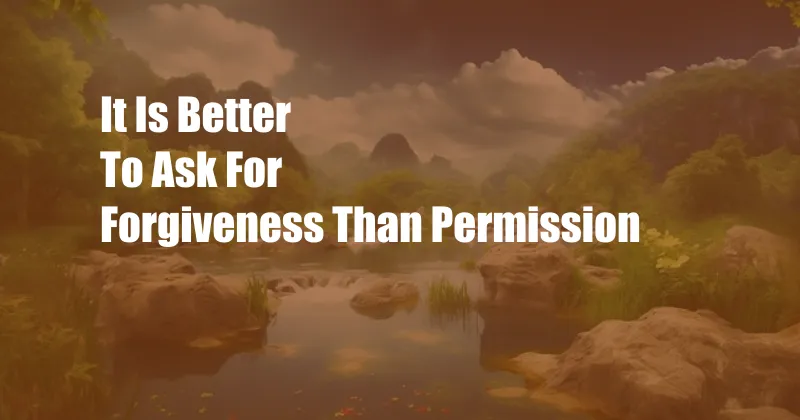
Is It Better to Ask for Forgiveness Than Permission?
In the realm of decision-making, a classic adage has sparked debate for centuries: “It is better to ask for forgiveness than permission.” This intriguing phrase suggests that acting first and seeking approval later is sometimes more advantageous than seeking permission beforehand.
From daring adventurers to innovative leaders, countless individuals have embraced this philosophy, believing that it empowers them to seize opportunities and drive progress. However, it is crucial to approach this concept with caution and weigh the potential consequences before embarking on any bold actions.
The Power of Initiative
Proponents of the “ask for forgiveness” approach argue that it allows for greater freedom and agility. By taking action without waiting for approval, individuals can capitalize on fleeting opportunities, innovate fearlessly, and create positive outcomes that might otherwise have been missed.
Moreover, this approach can foster a culture of initiative and accountability. When people are given the autonomy to act, they develop a sense of ownership and personal responsibility. This can lead to increased motivation, productivity, and overall success.
The Risks of Overreach
While the “ask for forgiveness” approach can have its merits, it is essential to recognize its potential risks. Acting without permission can sometimes lead to unauthorized actions, ethical dilemmas, and even legal consequences.
Furthermore, it can erode trust and damage relationships if individuals feel they have been bypassed or disrespected. It is crucial to carefully consider the context and potential impact of one’s actions before proceeding without approval.
Balancing Initiative with Responsibility
The key to successfully navigating the “ask for forgiveness” approach lies in balancing initiative with responsibility. Before taking any significant action, it is prudent to:
- Assess the risks and benefits: Weigh the potential consequences of acting without permission against the potential benefits it may bring.
- Consider the context: Understand the organizational culture, ethical implications, and legal framework in which you are operating.
- Seek guidance when necessary: If uncertain, consult with a trusted mentor, advisor, or colleague to gain insights and perspectives.
Expert Advice and Tips
Based on my experience as a blogger and my observations of successful individuals, I offer the following tips for embracing the “ask for forgiveness” approach responsibly:
- Start small: Begin by asking for forgiveness in low-risk situations to build confidence and understanding.
- Be transparent: Inform others of your intentions and reasons for acting without permission, and be prepared to explain your actions.
- Take ownership: Accept accountability for your actions, whether positive or negative, and be ready to make amends if necessary.
Conclusion
While the adage “it is better to ask for forgiveness than permission” may hold some truth, it is crucial to approach it with caution and responsibility. By carefully balancing initiative with accountability and following the expert advice outlined above, individuals can harness the potential benefits of this approach while minimizing the risks.
As you reflect on this topic, I invite you to consider whether the “ask for forgiveness” approach resonates with you. Whether you choose to embrace it or not, may you navigate the realm of decision-making with wisdom, courage, and a commitment to both progress and responsibility.
Frequently Asked Questions
Q: Is it always better to ask for forgiveness than permission?
A: No, it depends on the context, risks, and potential consequences of one’s actions.
Q: What are some ethical considerations when asking for forgiveness?
A: Be transparent, take ownership, and be prepared to make amends if necessary.
Q: How can I avoid damaging relationships when acting without permission?
A: Inform others of your intentions, explain your actions, and be open to feedback.